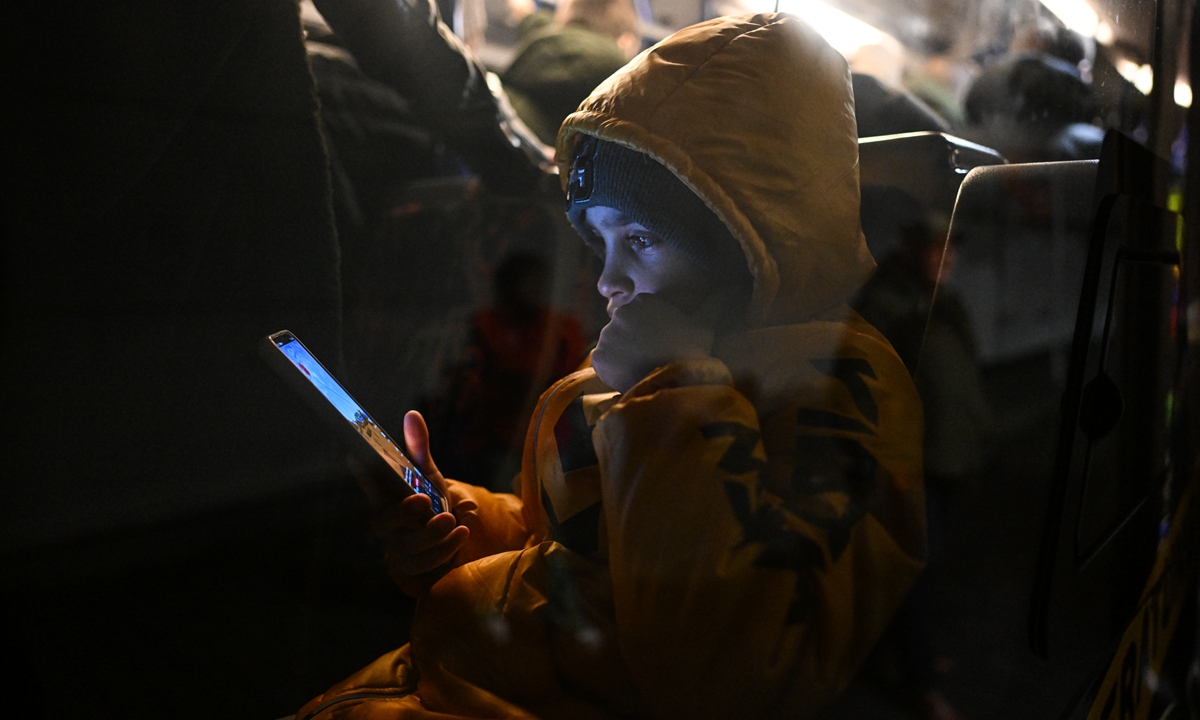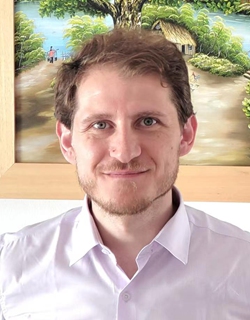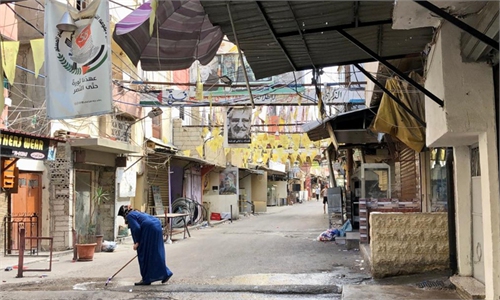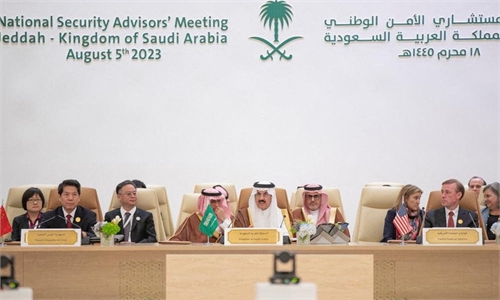US role in Ukraine crisis raises questions on responsibility and refugee response

A Ukrainian boy who fled the war and found shelter in a former supermarket converted for a refugee center plays on his smartphone inside a bus to take him and others to an evacuation train to Hannover on February 17, 2023, in Przemysl, Poland. Photo: VCG
Editor's Note:The refugee crisis in Europe is escalating as a result of the Russia-Ukraine conflict. There is a view that the war has begun to backfire on European countries in the form of refugees. In an interview with Global Times (GT) reporters Su Yaxuan and Li Aixin, Dario Mazzola (Mazzola), a researcher in political theory at the University of Bergen with a specialization in refugee issues, shared his views about the refugee issue facing the Europe.
GT: Some argue that the Russia-Ukraine conflict has already backfired on European countries through the influx of refugees. What is your perspective on this? Could you talk about the conflict in terms of economic and political pressures?
Mazzola: Refugee "crises" can only be understood in their broader contexts, and they are the manifestation of deep-seated and longstanding dynamics. When it comes to migration, there are two main and enduring unbalances that provoke these so-called "crises." One is Europe's demographic problem-its aging and shrinking population. The other is the dramatic and enduring inequality between European states and neighboring regions.
When it comes to refugees from Ukraine, the situation is as follows. As of today, United Nations High Commissioner for Refugees (UNHCR) has recorded more than 6 million refugees from Ukraine, making it one of the largest crises in recent world history. Even if the numbers are somewhat similar to the 2015 crisis, Ukrainians have direct, legal and relatively easy access to Europe. However, there remain significant problems in the response to Ukrainian refugees as well.
First of all, the Ukraine crisis comes after the COVID crisis, in a moment of grave economic and geopolitical tensions, including the disruption of global supply chains and high inflation. European economies have suffered significantly from the war, due to sanctions and the severing of economic ties with Russia, as well as the financial effort to support Ukraine militarily and in other spheres. There are also social problems such as aging that are not being addressed and are worsening every year. Financial institutions as big as Credit Suisse have gone bankrupt, and ordinary Europeans are finding it harder to pay rent and bills.
In the meanwhile, other crises of displacement have not abated. Resources are scarce, and policy focus is limited. Despite the ideological and political unanimity in supporting Ukrainian refugees, significant cracks have started to surface. This was evident in the reasons behind the end of Mark Rutte's government in the Netherlands.
To conclude, I think one key question is whether the European leadership has devised its response plans realistically, or whether it has fallen again prey to what Giandomenico Majone called a "culture of total optimism." The conflict in Ukraine could drag on for a long time, with negative economic implications. One can only hope that European leaders have considered the possibility that these individuals could remain in Europe for long or forever when planning their generous response to Ukrainian refugees.
GT: Can Europe resolve the refugee crisis? Will the refugee crisis affect European unity?
Mazzola: At the root of Europe's enduring crisis in the provision of asylum, we find at least three factors.
The first is Europe's inability to project a stabilizing influence in the region. In addition to the limitations of its foreign policy, there are deep divides within the European Union itself. Ideologically, economically, culturally and politically, the differences between countries such as Sweden and Hungary, Portugal and Lithuania, remain very large. Also, the EU boasts of its pluralism, but in recent years this has sometimes degenerated into polarization and conflicts. The third problem is that the long-lasting roots of the Ukraine crisis are to be found in the enduring global crisis of the balance of power.
And I think it is possible that the crisis will exacerbate problems that already exist and make this disunity more apparent. In the past, Europe has been deeply divided in its response to refugee crises. One narrative that has emerged is that of a conflict between a more open and diverse Western Europe and Visegrád countries, which are represented as being more nationalistic and exclusivist if not nativist altogether. There is also a North-South divide, with many appeals by Southern and island states for greater solidarity. On the contrary, Northern states tend to attribute some of the difficulties in border management to the perceived ineffectiveness of the Southern ones. There is also an emerging divide between "Old" and "New Europe," as the George W. Bush administration called them. Olaf Scholz admitted one year ago that "The center of Europe is moving eastward."
In this scenario of deep-seated divisions, even a unanimous policy such as the support for Ukrainian refugees can in the long run become problematic.

Dario Mazzola. Photo: Courtesy of Mazzola
GT: Europe has shown that it has a different attitude toward Ukrainian refugees compared to how it views Middle Eastern refugees. Some analysis suggests that the reason Europe readily accepts Ukrainian refugees is because they are predominantly white. What is your opinion on this?Mazzola: Diversity and equality are both fundamental values in European identity. Yet when not-so-diverse, white, and Christian Ukrainian refugees started to arrive, some commentators awkwardly and embarrassingly described them as "civilized" and "like us."
This double standard has understandably and rightly elicited outrage in the Global South. Of course, it is imperative to assist Ukrainian refugees, but it is also quintessential to be consistent and show in words and actions that African and Asian lives are just as worthy.
At the same time, I believe and have argued that the ethnocultural dimension is not the main factor to explain Europe's "special response" to Ukrainian refugees. If we look at Kosovo's Muslim refugees in Europe, or Vietnamese boat people in the US, we realize that refugee responses are deeply influenced by political goals and interests.
GT: The US is currently observing the European refugee crisis from afar. Could you comment on this? Will the backlash from refugee issue have an impact on the US? How do you view the role of the US in the Russia-Ukraine conflict?
Mazzola: There are currently many more Ukrainian refugees in the Czech Republic than in the US. The latter country has 33 times the population of the former. The White House reports having donated $340 million to support European states welcoming Ukrainian refugees. In comparison, Italy, despite being far from the top of the list of host countries, has spent more than €754 million. Therefore, if the calculations are correct, it seems fair to suspect a mismatch between the role, influence and power of the US, and the responsibility and costs it is assuming in the context of the Ukraine conflict, including its response to refugees.
More generally, Zelensky's disappointed tweet about the vague pathway traced by US-led NATO for Ukraine's membership at the recent Vilnius summit makes one wonder whether there is another mismatch between the level of military support expected and the one that will be provided in fact.
In conclusion, the refugee issue, as well as other aspects of the Ukraine crisis, has bolstered cooperation between the US and its allies in the first moment, but over time, the US faces two risks: strained and unbalanced relations with allies and a deepening divide between isolationists and interventionists within the US itself.
GT: How do you predict the future development of the Russia-Ukraine conflict? Will a compromise be reached or will it trigger a larger-scale war?
Mazzola: It is very difficult to see through the "fog of war" and make predictions on this matter. I will make some "educated guesses."
In the end, a negotiated peace is inevitable. China and a group of African states have advanced comprehensive peace proposals, while states as diverse as Brazil and the Vatican have offered themselves as mediators. As we know, Turkey briefly hosted peace talks almost immediately after the conflict started. As none of these serious attempts were successful, it is unlikely that any other will be unless conditions change.
So, tragically, the time for peace is still far. This is excruciating if one considers the suffering endured by the Ukrainian people, and more generally by those others in the world facing poverty and other hardships because of the conflict.
The New York Times reported that Ukraine is entering the "main thrust" of its counteroffensive. So far, this tremendous bloodbath has not achieved substantial territorial gains for Ukraine. But were the initiative to triumph eventually, Russia would be forced to rush into negotiations to avoid losing more ground - this is what Western decision-makers hope for. If, instead, Ukraine's counteroffensive fails, I do not see any reason why Russia would accept the negotiation proposals that would be thrown at it.
Again, these are mere speculations, or imaginary scenarios with different alternative evolutions of the conflict. I believe Ukraine's only way into NATO would be through a clear victory. But even Mark Milley, chairman of the US Joint Chiefs of Staff, declared last November that a full Ukrainian victory is militarily "unlikely," and more recently and forcefully professor Sean McFate has explained that expecting Ukraine to be able to clench a decisive victory is "the definition of strategic insanity."
Mazzola: Giorgia Meloni, the prime minister of Italy, has been discussing exiting the Belt and Road Initiative (BRI). I don't think this is a promising development for the European economy, especially in Italy. Is Italy really treating China like any other country? Can cooperation with China no longer be one of Italy's strong economic prospects?
China represents about 1/6 of the global population. China is a huge country in terms of population, and its economic influence seems to be unavoidable. Meloni's advisors were educated in an epoch and in institutions that made the US look omnipotent, but the world has changed so much, and there are other perspectives on global development.
Furthermore, in recent years Italian governments and in particular Mario Draghi had intervened on the implementation of the agreement and almost stopped it. So, I do not see the necessity to eliminate it altogether, nor the fundamental risks it would have posed.


